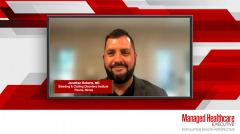Recognizing Bleeds and Tailoring Treatment: Addressing Challenges in Treating Hemophilia A Across Disease Severity
The challenges associated with treating hemophilia A become increasingly complex with varying disease severity.
Jonathan Roberts, M.D.: The challenges with treating hemophilia A with increasing disease severity are multifactorial. If you take a step back and look at patients with more mild hemophilia sometimes the challenges are these patients may not get diagnosed until much further into adulthood. I take care of children and adults and I’ve diagnosed many patients with mild hemophilia well into their adult years. So the psychological impact of having a bleeding disorder and how to treat it. You know, they have a lot of times lived with bleeding symptoms their entire lives and not really knowing how to manage it well. So, there can be a learning curve for knowing what how to recognize a bleed, how it should be treated, how much treatment is needed [and] the intensity of treatment. And that can sometimes be a challenge for patients. When they’re more moderate as well, in mild and moderate [hemophilia A], I would say there can be challenges with bleed recognition because they may feel an ache or pain and they may not know that’s actually a bleeding event that they need to treat. Historically, they have not and some of them have morbidity from untreated bleeds. So, getting them to recognize when you should treat what type of a situation whether it be trauma or activity they should treat. In more severe patients or severe bleeding phenotype patients, typically from a very young age, they have learned what a bleed feels like, or how to recognize it. I’ve noticed that some of the challenges with more of the extended half-life therapies are that they become more reliant on not having bleeds. So then they may let something go too long. Again, more like a mild or moderate patient, and then you’re back to tracking and trying to treat them more frequently or aggressively to try to get a bleed under control. Severe patients bleed more, so it becomes more incorporated into their lifestyle. A lot of times they are their own experts at treating their hemophilia. So, there’s definitely a spectrum, and certainly with the different challenges of severity can be a challenge to treat clinically as well.
Transcript edited for clarity.
Newsletter
Get the latest industry news, event updates, and more from Managed healthcare Executive.























